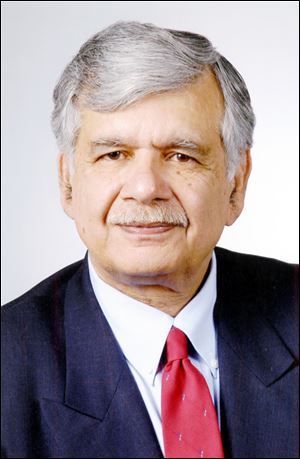
COMMENTARY
ISIS’ violence needs a strong response
Iraq’s landscape is being shaped contrary to our interests
9/1/2014
Hussain
The rise of militant Sunni Muslims in parts of Syria and Iraq has been in the making for more than 40 years. The Islamic State in Iraq and Syria (ISIS) has in the past six months consolidated its gains with the fall of the northern Iraqi city of Mosul. Its progress, however, has been slowed with recent aerial bombardment and drone attacks by the United States.
The air campaign was started to rescue members of the minority Yazidi sect who fled to the mountains when ISIS fighters overran their stronghold, Sinjir. The besieged minority was told: Convert to Islam or die. Most Muslims are as surprised and shocked by these stark choices as is the rest of the world.
The current wave of Sunni militancy is not new. The struggle between orthodoxy and progress is an old one.
Those on the extreme right of the religious spectrum believe that the kind of Islam practiced by most Sunnis is an aberration from the original intent of God. They conveniently assign themselves the responsibility of deciding what is right and what is not.
There are as many interpretations of the will of God as there are Muslim sects and sub-sects. Those on the extreme right interpret Scripture in a literal way that doesn’t leave room for other opinions.
The core question is whether Islam permits persecution of minorities. The answer is that it does not. The Koran clearly states that there is no compulsion in religion.
Certain passages in the Koran, on the surface, appear to advocate violence against minorities. Without historic context, militants find it convenient to hide behind the text and unleash brutality against minorities.
Militants also are driven by the desire to spread the word of God as they interpret it. They believe that the ultimate salvation of every human being is to become a Muslim.
Proselytizing is at the core of many religions. But most religions have moved away from using violence as a means of attaining that goal. ISIS would kill anyone — including other Muslims — who would not convert to its brand of Islam.
In the Arabian Peninsula, Abd al-Wahhab (1703-1792), a firebrand preacher, started a revivalist movement to strip Islam of its cultural trappings. He sought to bring it back to the simple and austere faith practiced in its early history. The movement also set aside compassion, which is at the core of religion.
When the kingdom of Saudi Arabia was established in the 1920s, Wahhabi Islam became the official religion of the kingdom. Wahhabis constitute 3 percent of Sunni Muslims worldwide.
During the Soviet invasion of Afghanistan, from 1979 to 1989, the United States and other Western countries collaborated with Saudi Arabia and Persian Gulf states to aid Afghan freedom fighters, the mujahideen, in their fight against the Soviets. Saudi petrodollars financed religious schools that taught the Wahhabi brand of Islam and produced young men who were eager to become cannon fodder in Afghanistan.
The Taliban and the Sunni militants in Iraq — and elsewhere in the world — show the same radicalization that helped defeat the Soviet Union in Afghanistan.
The handwriting was on the wall when unsavory Sunni elements entered the fighting against Syrian President Bashr Assad. Militants also are exploiting Sunni grievances in neighboring Iraq.
The result is the repressive Islamic State, which straddles Iraq and Syria and has surpassed the Taliban, al-Shabab, al-Qaeda, and Boko Haram in brutality and savagery.
The Islamic State does not bode well for Muslims or non-Muslims. Aerial bombardment can accomplish limited objectives. This phenomenon requires limited deployment of American forces, along with those of a coalition of other countries in the region.
The 2003 Iraq invasion was a folly that cost the United States $4 trillion, 4,500 lives, and thousands of injuries. Neoconservatives wanted to change the Iraqi landscape. They failed miserably.
Now the landscape is being shaped contrary to the interests of us and our allies. That requires a robust response.
Dr. S. Amjad Hussain is a retired Toledo surgeon whose column appears every other week in The Blade.
Contact him at: aghaji@bex.net